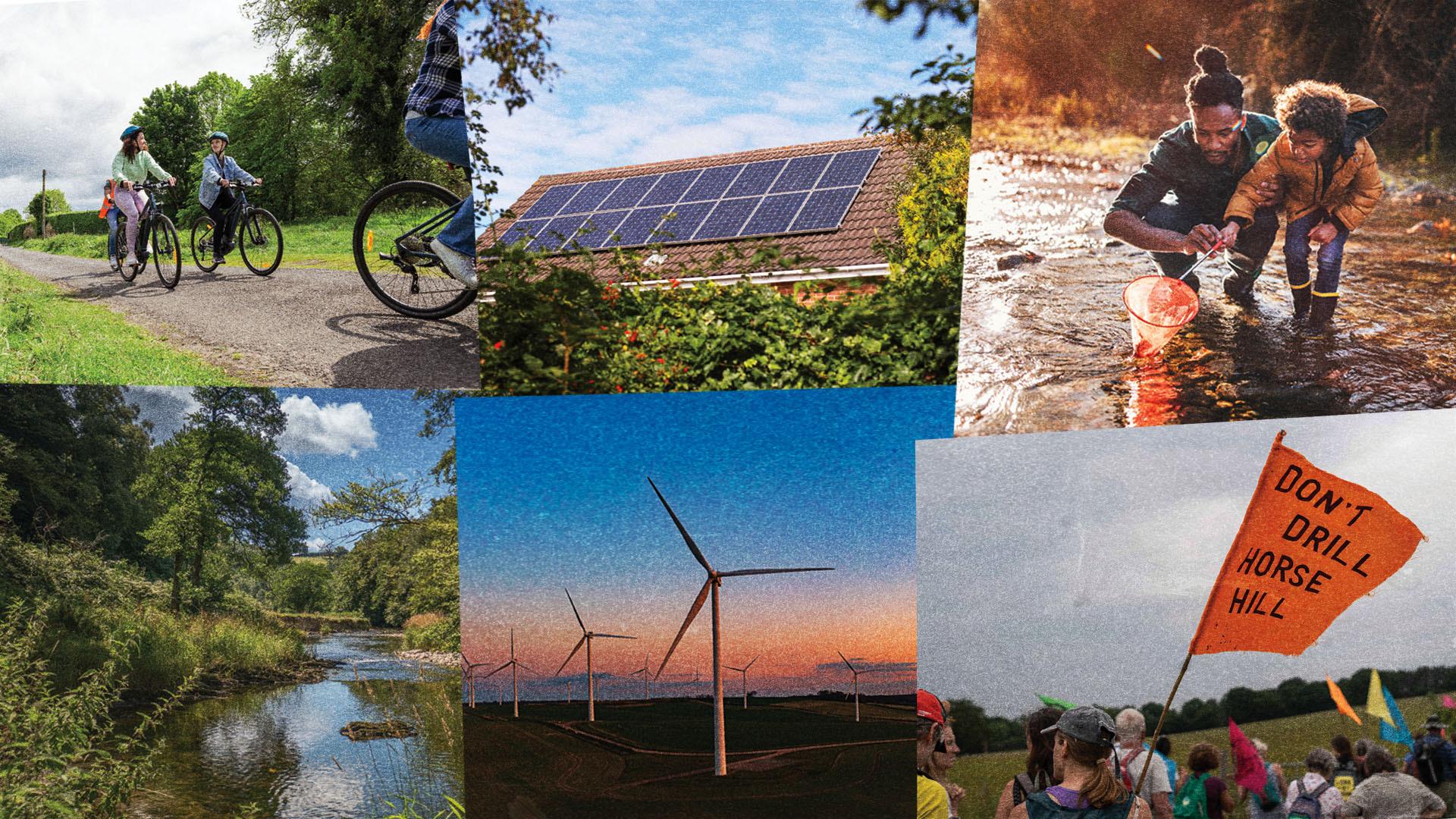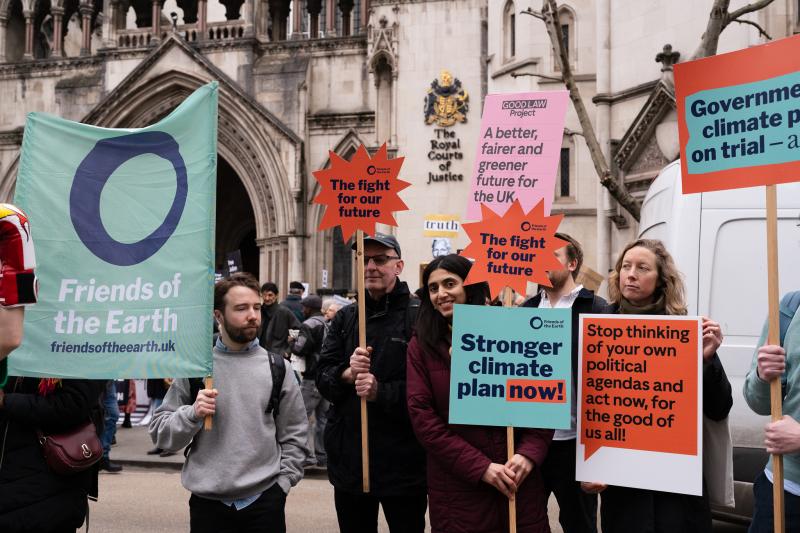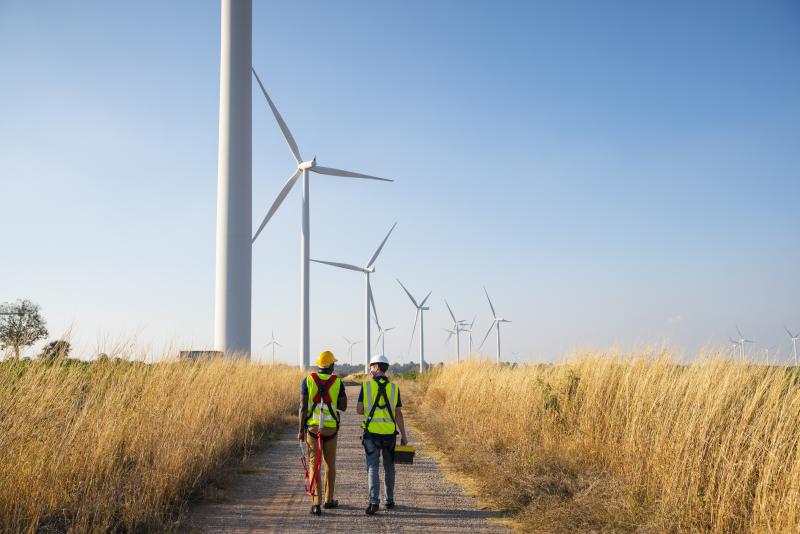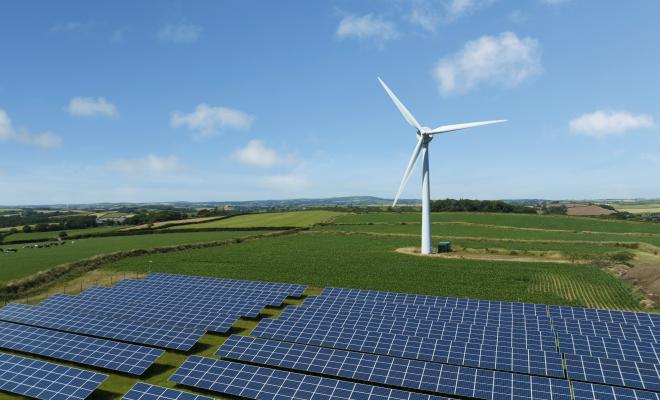26 Sep 2024
Following a successful legal challenge from Friends of the Earth and others, the government must write a new climate plan in 2025. This briefing explains:
- Why we need a new climate plan
- What it should include
- What it’ll deliver for the UK.
Why we need a new climate plan
In 2008 the government passed the Climate Change Act in response to urgent demands for action from scientists and following a multi-year NGO campaign, led by Friends of the Earth. This was the world’s first law setting legally binding targets for cutting climate emissions.
Since then, Friends of the Earth has closely monitored the implementation of the act. Over the past 3 years, this has included 2 successful legal challenges to the climate plans of the previous UK government, which were declared unlawful by the courts.
The most recent court victory means that the new UK government is legally obliged to write a new climate plan in 2025. And we desperately need a new plan, because the UK is dangerously off track to meet its climate targets, notably its pledge to the rest of the world to cut emissions by over two-thirds by 2030. According to the Climate Change Committee (the UK government’s official advisors), “urgent action is needed” to meet this goal.
What does a bold and fair climate plan look like?
The new plan must be comprehensive, ambitious and fair. It must make sure the UK meets all its climate commitments, and it must put fairness at the heart of climate action, ensuring that the benefits are shared equally across society, with no one left behind.
Friends of the Earth has 5 key demands, as well as policies that we believe should be included to meet these demands. Read our full policy recommendations in our research report, "The Fairness Test: a mandate for bold climate policy".
Our 5 key demands of the UK government are to:
- Keep its promises to cut carbon emissions by developing credible policies, created with experts and the public.
- Invest in the future by fairly financing local, devolved nation, UK and international climate action.
- Ensure everyone can live in a warm home powered by cheap, clean energy.
- Deliver affordable, reliable public transport and clean air.
- Help people find well-paid green jobs by providing investment and training, especially for sectors and places most at risk of being left behind.
Friends of the Earth’s demands in detail
1. Keep its promises to cut carbon emissions by developing credible policies, created with experts and the public
The Climate Change Committee has said that there are only credible plans in place to achieve a third of the emissions cuts needed to meet the UK government’s 2030 climate commitment.
The new plan should include:
- Credible policies, as assessed by the Climate Change Committee, that fully deliver on the 2030 commitment, the 2035 international commitment (which the UK government must set by early 2025) and carbon budgets.
- Robust contingency plans to be used if policies set out don’t deliver as expected – the previous plan made the unrealistic assumption, criticised by the courts, that all policies would achieve 100% of their intended emissions cuts.
- The views of experts and the public, with input from the Climate Change Committee, parliament, civil society and a permanent, representative climate citizens panel, as recommended by the Climate Citizens Research Group.
- An equality impact assessment and economic analysis of the plan to ensure the costs and benefits are shared fairly. It isn’t fair if the poorest in society, who’ve contributed the least to the problem, bear the brunt of the costs or lose out on the benefits.
- A commitment to publish a public engagement strategy to explain why we need to act, to involve people in developing policies that affect them, and to give them the information and support they need to make changes.
2. Invest in the future by fairly financing local, devolved nation, UK and international climate action
Climate action is essential investment in the UK’s future, supporting the UK government’s missions to scale up clean energy, create growth and improve opportunities. To help finance this, we need to make rich polluters pay. The wealthy have contributed disproportionately to the climate crisis, with the richest 1% emitting more than the poorest two-thirds of humanity.
Measures in the new plan should include:
- Mobilising at least £50 billion a year in public and private finance for climate action, as recommended by the Climate Change Committee. This is about 2% of GDP and a similar amount to pledges made for defence spending.
- Ensuring that devolved nations are fully involved in the development of the plan and that their policies are fully captured within it.
- Giving all local and combined authorities a statutory duty to help hit the UK’s climate targets, backed up by local money-raising powers and more long-term, stable funding from central government.
- Raising funds for climate investment by making rich polluters pay. This could be done through taxing carbon-intensive luxury consumption like private jets, and taxing income from shares in polluting companies (for example, through the introduction of a carbon capital gains tax or a carbon investment tax, or by extending the windfall profit taxes to other sectors beyond fossil fuel producers).
- Delivering on the UK’s commitment to pay £11.6 billion in climate finance to poorer countries, in addition to overseas aid.
3. Ensure everyone can live in a warm home powered by cheap, clean energy
Millions of people will continue to struggle to pay their energy bills this winter, because years of government inaction has left homes damp, cold and expensive to heat. A report for Friends of the Earth by Professor Sir Michael Marmot’s Institute of Health Equity found that cold homes cost the country tens of billions of pounds a year in lost productivity and NHS costs, and also increase the risk of children and adults developing mental health problems. Tackling this crisis by improving insulation and moving to homes heated by electricity rather than gas will cut emissions and put money back in people’s pockets.
Measures in the new plan should include:
- Kickstarting a nationwide insulation programme to insulate at least 7.5 million of our heat-leaking homes.
- Ensuring energy is affordable, by introducing a social tariff for low-income families and by rolling out cheap renewables (such as onshore wind and solar farms) fast so that current annual build rate is increased at least threefold and new renewables have grid connections.
- Providing heat pumps to lower-income households for free, and offering other households interest-free loans to cover costs above UK government grants, as recommended by the National Infrastructure Commission.
- Reducing the cost of electricity by removing the policy costs currently applied to electricity bills.
4. Deliver affordable, reliable public transport and clean air
Although the growth in sales of electric cars is very welcome, this alone won’t deliver the emissions cuts needed from transport. We must also greatly improve public transport, particularly buses (as since 2008 urban bus service levels have fallen by 48% and rural bus service levels by 52%), and encourage more cycling and walking. This will also help those who can’t afford a car, particularly an electric car.
Measures in the new plan should include:
- Setting a demand reduction target to cut vehicle miles by at least 20% by 2030, using more affordable public transport and better cycling and walking facilities to achieve this.
- Committing to more than double bus passenger kilometres and increase rail passenger kilometres by 80% by 2030.
- Increasing expenditure on active travel to £2 billion a year to make it safe and easy for people to cycle and walk for short journeys.
5. Help people find well-paid green jobs by providing investment and training, especially for sectors and places most at risk of being left behind
We need a strong industrial strategy to ensure the development of the technologies of the future, and to embrace the green potential in sectors such as services, farming and land management. But moving to a greener economy will inevitably mean the decline of some sectors (such as oil and gas extraction) and changes to others (such as steel making). Workers in these sectors must be involved in shaping the green transition to ensure it's fair, and places currently reliant on fossil fuel industries for employment must be put at the forefront of the transition.
Measures in the new plan should include:
- Investing a minimum of £4 billion a year in skills development, retraining and job creation, including in areas most in need of investment.
- Requiring growth industries such as renewables, heat pumps, electric vehicles and sustainable timber to grow UK supply chains and guarantee good-quality, secure UK jobs.
- Committing to a comprehensive climate skills plan, following the lead of Scotland and Wales, and as recommended by the Climate Change Committee.
What would a bold and fair climate plan deliver for the UK?
A new climate plan as outlined above would get the UK back on track to meet its climate targets – both its legally binding domestic targets under the Climate Change Act and its international commitments. According to Energy Security and Net Zero Secretary Ed Miliband, this is a key priority for the new UK government. This is particularly critical regarding the 2030 commitment, as all of the planning and nearly all of the delivery needed to meet this target must take place during the current parliament.
Ambitious, comprehensive and fair climate action would not only cut carbon emissions, but also help ensure that everyone benefits from cheap and reliable energy, warm homes, clean air, widespread public transport, thriving nature and well-paid green jobs. These align closely with the UK government’s 5 missions. For example:
- A programme of insulation for the country’s coldest homes would cut household energy bills and put money back into people’s pockets. Figures from Rightmove show that moving from an EPC E rating to an EPC C rating would cut the average energy bill for a 2-bed flat from £2,497 to £1,260, a saving of almost 50%. For a 3-bed semi-detached house, the average bill would fall from £2,945 to £1,528, again close to a 50% decrease.
- Warmer homes would cut costs for the NHS and social services. The societal costs of cold homes (NHS and care costs, potential mental health costs and loss of economic potential) have been estimated at £15 billion a year. Warmer homes would also help improve educational attainment, particularly for children from low-income households, by reducing the number of school absences. UK rates of absence due to cold, damp homes are 80% higher than the EU average.
- Reducing air pollution would help cut the cost of the problem to the NHS and businesses, estimated in 2021 to be £20 billion annually.
- Investment in climate action leads to economic growth. The UK’s net zero economy grew by 9% in 2023, compared with 0.1% for the economy overall. And the Confederation of British Industry (CBI) has estimated that investment in areas such as electric vehicles, renewables and insulation “could increase UK GDP by 1.6-2.4% in 2030, representing 14-20% of total GDP growth between now and 2030”.
Finally, having an ambitious, comprehensive and fair plan, particularly one which ensures we meet our international climate commitments, will be vital if the UK is to achieve the global climate leadership the UK government has pledged.









